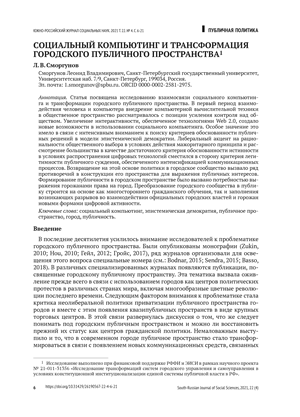Аннотация
Статья посвящена исследованию взаимосвязи социального компьютинга и трансформации городского публичного пространства. В первый период взаимодействия человека и компьютера внедрение компьютерной вычислительной техники в общественное пространство рассматривалось с позиции усиления контроля над обществом. Увеличение интерактивности, обеспеченное технологиями Web 2.0, создало новые возможности в использовании социального компьютинга. Особое значение это имело в связи с интенсивным вниманием к поиску критериев обоснованности публичных решений в модели эпистемической демократии. Либеральный акцент на рациональности общественного выбора в условиях действия мажоритарного принципа и рассмотрение большинства в качестве достаточного критерия обоснованности истинности в условиях распространения цифровых технологий сместился в сторону критерия легитимности публичного суждения, обеспеченного интенсификацией коммуникационных процессов. Возвращение на этой основе политики в городское сообщество вызвало ряд противоречий в конструкции его пространства для выражения публичных интересов. Формирование публичности в городском пространстве было вызвано потребностью выражения горожанами права на город. Преобразование городского сообщества в публику строится на основе как многостороннего гражданского обучения, так и заполнения возникающих разрывов во взаимодействии официальных городских властей и горожан новыми формами цифровой активности.
Ключевые слова
Информация о финансировании
Исследование выполнено при финансовой поддержке РФФИ и ЭИСИ в рамках научного проекта № 21-011-31356 «Исследование трансформаций систем городского управления и самоуправления в условиях конституционной институционализации единой системы публичной власти в РФ».
Библиографические ссылки
Amin, A. (2008) Collective Culture and Urban Public Space. City, 12(1), 5–24. DOI: 10.1080/13604810801933495
Basso, S. (2018). Rethinking Public Space Through Food Processes: Research Proposal for a “Public City”. Urbani Izziv, 29, 109–124.
Benson, J. (2019). Knowledge and Communication in Democratic Politics: Markets, Forums and Systems. Political Studies, 67(2), 422–439.
Bodnar, J. (2015). Reclaiming public space. Urban Studies, 52(12), 2090–2104.
Calhoun, C. (1986). Computer Technology, Large-Scale Social Integration, and the Local Community. Urban Affairs Quarterly, 22(2), 329–349.
Chen, J. & Liu, J. (2014) Introduction: Social Computing and Social Networks. Journal of Organizational Computing and Electronic Commerce, 24(2–3), 119–121. DOI: 10.1080/10919392.2014.896712
Cohen, J. (1986). An Epistemic Conception of Democracy. Ethics, 97(1), 26–38.
Danziger, J. (1986). Computing and the Political World. Computers and the Social Sciences, 2, 183–200.
Denning, P. (2010). Computing Science: The Great Principles of Computing. American Scientist, 98(5), 369–372.
Evans, J. (2020). Social Computing Unhinged. Journal of Social Computing, 1(1), 1–13. DOI: 10.23919/JSC.2020.0002
Geyl, Ya. (2012). Goroda dlya lyudey [City for People]. Moskva: Al’pina Pablisher.
Goodin, R., Spiekerman, K. (2018). An Epistemic Theory of Democracy. Oxford: Oxford University Press.
Groys, B. E. (2017). Publichnoe prostranstvo: ot pustoty k paradoksu [Public Space: From Emptiness to Paradox]. Moskva: Strelka Press.
Hannon, M. (2022). Are knowledgeable Voters better voters? Politics, Philosophy & Economics, 21(1), 29–54.
Hou, J. (2010). Insurgent Public Space: Guerrilla Urbanism and the Remaking of Contemporary Cities. New York: Routledge.
Karaliotas, L. (2020) Ronan Paddison on Public Space and the Postpolitical. Space and Polity, 24(2), 252–261. DOI: 10.1080/13562576.2020.1787136
König, P. D. (2021). Truth Versus Ignorance in Democratic Politics: An Existentialist Perspective on the Democratic Promise of Political Freedom. Contemporary Political Theory, 20(3), 614–635. DOI: 10.1057/s41296-020-00436-y
Lebedeva, E. V. (2016). Transformaciya publichnogo prostranstva postsovetskih gorodov [Transformation of Public Space of Postsoviet Cities]. Sociologiya [Sociology], 4, 107–115.
Lefebvre, H. (1996). The Right to the City. In Lefebvre, H. Writings on cities. Oxford: Blackwell. Pp. 63-184.
Mehta, V. & Bosson J. (2021). Revisiting Lively Streets: Social Interactions in Public Space. Journal of Planning Education and Research, 41(2), 160–172.
Mihaylova, E. (2020). Slaktivizm: sovremennye IKT kak resurs formirovaniya i artikulyatsii obshchestvennogo mneniya [Slactivism: Contemporary ICT as a resourse of forming and articulation of public opinion]. Mezhdunarodnaya zhizn’ [International Life], 3, 96–105.
Moir, S. & Crowther, J. (2017). Radicalising citizenship education. Andragoška spoznanja, 23(3), 17–34.
Moore, A., Invernizzi-Accetti, C., Markovits, E., Pamuk, Z. & Rosenfeld, S. (2020). Beyond Populism and Technocracy: The Challenges and Limits of Democratic Epistemology. Contemporary Political Theory, 19(4), 730–752. DOI: 10.1057/s41296-020-00398-1
Peter, F. (2007). Democratic Legitimacy and Proceduralist Social Epistemology. Politics, Philosophy & Economics, 6(3), 329–353.
Popović, K., Maksimović, M., Jovanović, A., Joksimović, J. (2020). New Learning Sites in Learning City — Public Pedagogy and Civil Education. Andragoška spoznanja/Studies in Adult Education and Learning, 26(1), 33–51.
Ptichnikova, G. A., Chernichkina O. V. (2019). Informacionno-tekhnologicheskaya model’ obshchestvennogo prostranstva sovremennogo goroda [Information Technology Model of Modern City Public Space]. Gradostroitel’stvo i arhitektura [Urban Planning and Architecture], 9(2), 53–60.
Robertson, D. & Giunchiglia, F. (2013). Programming the Social Computer. Philosophical Transactions: Mathematical, Physical and Engineering Sciences, 371(1987), 1–14.
Rosenbloom, J. & Ginther, D. (2017). The Effectiveness of Social Science Research in Addressing Societal Problems: Broadening participation in computing. Science and Public Policy, 44(2), 259–273.
Rosenfeld, S. (2019). Democracy and Truth. A Short History. Philadelphia: University of Pennsylvania Press.
Sabah, M., Fang, W. C., Hassanien, A. E. & Kim, T. (2021). Advanced Data Mining Tools and Methods for Social Computing. The Computer Journal, 64(3), 281–285.
Sendra, P. (2015). Rethinking Urban Public Space. City, 19(6), 820–836. DOI: 10.1080/13604813.2015.1090184
Shklovski, I. & Chang M. F. (2006). Guest Editors’ Introduction: Urban Computing: Navigating Space and Context. Computer, 39(9), 36–37.
Smith, R. J. & Hetherington, K. (2013). Urban Rhythms: Mobilities, Space and Interaction in the Contemporary City. The Sociological Review, 61(S1), 4–16. DOI: 10.1111/1467-954X.12050
Solov’ev, A. I. (2021). “Dokazatel’naya politika” i “politika dokazatel’stv”: dilemma postsovetskih obshchestv [“Evidence-Based Politics” and “Evidence Politics”: the Dilemma of Post-Soviet Societies]. Kontury global’nyh transformaciy: politika, ekonomika, pravo [Contours of Global Transformations: Politics, Economics, Law], 14(5), 61–80. DOI: 10.23932/2542-0240-2021-14-5-3
Touraine, A. (1998). Vozvrashchenie cheloveka dejstvuyushchego. Ocherki sociologii [The Return of the Acting man. Essays in Sociology]. M.: Nauchnyy mir.
Zhelnina, A. A. (2015). Kreativnost’ v gorode: reinterpretaciya publichnogo prostranstva [Urban Creativity: Reinterpreting the Public Space]. Zhurnal sociologii i social’noy antropologii [The Journal of Sociology and Social Anthropology], 2(78), 45–59.
Zukin, S. (2010). Naked City: The Death and Life of Authentic Urban Places. Oxford: Oxford University Press.


